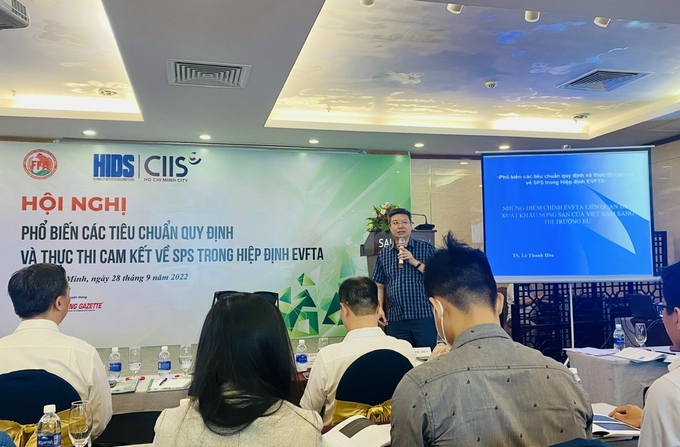November 25, 2025 | 12:33 GMT +7
November 25, 2025 | 12:33 GMT +7
Hotline: 0913.378.918
November 25, 2025 | 12:33 GMT +7
Hotline: 0913.378.918

Dr. Le Thanh Hoa, Director of SPS Vietnam Office giving a speech at the workshop.
At the Workshop on disseminating regulatory standards and implementing SPS commitments under the EVFTA, Dr. Le Thanh Hoa, Director of SPS Vietnam Office, recommended the Ministry of Agriculture and Rural Development to promptly issue a plan to implement Vietnam's commitments on Sanitary and Phytosanitary Measures (also known as SPS) immediately after the EVFTA came into effect in August 2020.
"The main groups of activities of interest are the dissemination and update of information regarding SPS within the framework of the EVFTA. Additionally, we need to accelerate the review of policy mechanisms as well as the strengthening of food safety and quality management in compliance with EU regulations" said Mr. Hoa.
As a considerably difficult market to access, the EU pays special attention to the regulations on the risk of microbial and chemical contamination for vegetables and fruits exported to the EU. Risks of unsafe aquatic products with regards to residues of banned antibiotics, parasiticides, residues of aquatic toxins, heavy metals, seafood processing additives, microbial contamination among many others are also of great interest to this fastidious market.
For manufacturers and exporters, the EU requires businesses to qualify for various food safety certification systems including the ISO 22000 or HACCP; food safety and quality standards, quality inspection and supervision, regulations on traceability for raw materials, finished products and distribution, product recall if necessary and so on.
Consequently, Director Le Thanh Hoa recommended domestic businesses to train and improve capacity for managers, technicians, producers and processing units. In addition, businesses must have an investment strategy in order to build cultivation areas and cooperate with producers to establish production processes that can strictly meet the food safety requirements; they must also have a plan to monitor hazards throughout the entire production process, with special focus on microbial hazards and pesticide residues.
"The monitoring programs are not limited to the production and processing of products but also the labor and environmental issues. In the future, other markets are likely to impose similar or stricter requirements. Therefore, meeting these regulations promptly will help products from exporting businesses reach any market in the world", Mr. Hoa emphasized.
After 2 years of implementing the EVFTA Agreement, Vietnam's export turnover to the EU market reached nearly 83 billion USD, which is an increase of approximately 15%. Namely, the two-way trade turnover between Vietnam and the EU reached more than 57 billion USD in 2021, an increase of 14.5% over the same period in 2020.
Most notably, Vietnam exported over 40 billion USD in value, an increase of 14.2% and contributed around 23.2 billion USD in trade surplus to the EU. Regarding the field of agriculture and fishery, Vietnam's export turnover to the EU market reached 3.2 billion USD, which is an increase of 11.1% over the same period in 2020.
On the other hand, Vietnamese businesses need to pay close attention to new consumption trends in association with the green economy, circular economy, environmental protection, etc. to have a suitable production and business strategy and meet the needs of the market trend.
The EVFTA helps bring most tax rates to 0%, but other technical barriers will be raised by the EU as a result. In order to respond to the arising situation, the SPS Vietnam Office suggested businesses to strengthen and build different channels to exchange information on food safety regulations of the market between the management agency, the producer, and the exporter.
This is the basis for specific type of fruit and vegetable export to properly and fully meet the regulations of the markets.
Statistics from the Vietnam SPS Office showed that through reports by the EU regarding Vietnam's exported agricultural, food and aquatic products in 2021, there are a total of 40 violation notices, including 18 for aquatic products; 22 for agricultural products and food.
Out of 40 total notices, there are 19 notices regarding chemical residue violations, accounting for 47.5%. Illegal irradiation, food additives, etc. violations account for 20% with 8 notices; 7 biological pollution violation notices, accounting for 17.5%; 5 antibiotic residues violation notices, accounting for 12.5%.
If businesses and production units fail to promptly update information on the requirements of the import market, it can easily lead to violations.
Translated by Nguyen Hai Long

(VAN) An Giang promotes supply-demand connections, standardizes quality and builds value chains, creating a foundation for sustainable bird’s nest development and aiming to expand exports.
/2025/11/24/5339-4-nongnghiep-075331.jpg)
(VAN) Recently, the conference on 'Sustainable Fisheries Linkage Chain - Tilapia for Export' took place in Tien Hai commune, Hung Yen province.
/2025/11/21/4309-2-153400_128.jpg)
(VAN) Green and low-emission rice is paving the way for Vietnamese rice to enter high-end markets, marking the beginning of a transformation journey toward greening and elevating the national rice brand.

(VAN) ‘Right to Win’ outlines a national action plan that shapes a new vision for Viet Nam’s agriculture in an era of renewal and global integration.

(VAN) Lam Dong’s farmed sturgeon output this year is expected to reach 2,300 tons, worth VND 450 billion, affirming the brand’s position on the market.

(VAN) A surge in Ukrainian egg exports, largely driven by soaring sales to the UK over the last few years, has notably pushed up egg prices on the domestic market.

(VAN) The price of Arabica Catimor coffee in Quang Tri is currently at VND 25,000–27,000/kg (fresh cherries), the highest level ever recorded